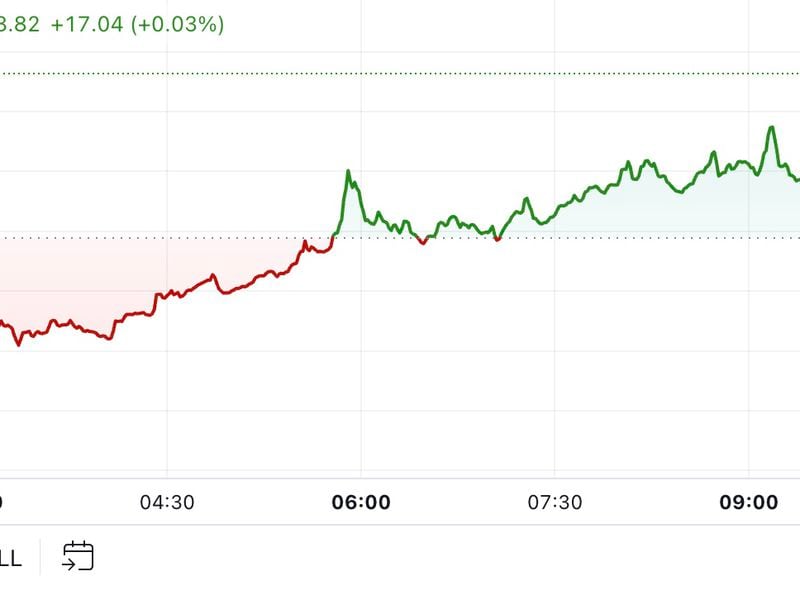Bitcoin Jumps to 3-Week High Near $8,600 as Fed Plans New Round of Reserve Increases

View
- The Fed’s decision to expand its balance sheet is seen as a long-term positive development for bitcoin by crypto market experts.
- Speculation that SEC might approve ETF application by Bitwise is fueling optimism that more investors could allocate funds to the cryptocurrency.
- Prices for ethereum and bitcoin may have gotten a jolt of enthusiasm from an announcement that UNICEF , the United Nations Children’s Fund, would launch a fund to accept donations of bitcoin and ethereum.
Bitcoin (BTC) jumped 5.1 percent on Wednesday to the highest price in three weeks, after the Federal Reserve (Fed) said it would print money to expand the size of bank reserves – seen as a move by the U.S. central bank that could spark inflation.
The top cryptocurrency surged to $8,587.29 as of 19:35 UTC time (3:35 p.m. New York time), according to CoinDesk’s Bitcoin Price Index.
Bitcoin suffered a steep drop in late September, tumbling from above $10,000, a move analysts attributed to big margin calls on the Bitmex exchange and disappointment over the debut of a new futures contract on the Intercontinental Exchange’s Bakkt digital-asset trading platform.
During the monthly futures contract’s first week of trading, it managed to garner just $5 million of total volume, disappointing industry observers who had anticipated a higher uptake from big institutional investors.
But on Tuesday, Federal Reserve Chair Jerome Powell said the central bank will soon start expanding its balance sheet again in an effort to avoid a repeat of the recent turmoil in the money markets. Powell said the Fed may have to keep pumping money into the financial markets by buying securities in the coming days in order to ensure the smooth functioning of short-term lending markets.
Joe DiPasquale, CEO of the cryptocurrency-focused investment firm BitBull Capital in San Francisco, said in a phone interview that bitcoin prices typically rise when the Federal Reserve loosens monetary policy – such as earlier this year, when the central bank’s first interest-rate cuts in a decade helped push prices to a 2019 high around $12,900 in late June.
“We know that that has historically helped bitcoin,” DiPasquale said.
Bitcoin prices have more than doubled from where they started 2019, around $3,700.
There’s also speculation in the market that the U.S. Securities and Exchange Commission might approve a bitcoin-based exchange-traded fund (ETF) from Bitwise, which says on its website that it pioneered the first cryptocurrency index fund.
Matt Hougan, the firm’s global head of research, told CNBC on Monday that “we’re closer than we’ve ever been before to getting a bitcoin ETF approved.” A decision is due by Monday, Hougan said.
“There’s some hope in the industry, which would make it much easier for people to purchase bitcoin,” DiPasquale said in the interview with CoinDesk.
DiPasquale said he thinks the proposal might be rejected, which could send bitcoin prices back down below $8,000.
Another factor helping to drive prices higher Wednesday, according to Blockforce Capital Chief Investment Officer David Martin, was an announcement that UNICEF , the United Nations Children’s Fund, would launch a fund to accept donations of bitcoin and ethereum, another cryptocurrency.
“That news broke and that’s what’s popping in the market today,” Martin said in a phone interview.
Ethereum surged 6.4 percent to $190.82.
Martin said that ethereum’s price started moving prior to bitcoin’s surge, perhaps since UNICEF said the first contributions under the new program would come from the Ethereum Foundation.
Some investors and analysts describe the Fed’s latest operation as round four of quantitative easing (QE) – central bank purchases of government securities or other securities from the market to increase the money supply and encourage lending and investment. The Fed conducted three rounds of quantitative easing between 2009 and 2015.
Many observers are of the opinion that the QE programs are inflationary in nature and consider bitcoin as a hedge against such policies.
Disclosure: The author holds no cryptocurrency assets at the time of writing.
Frankfurt bull image via Shutterstock









